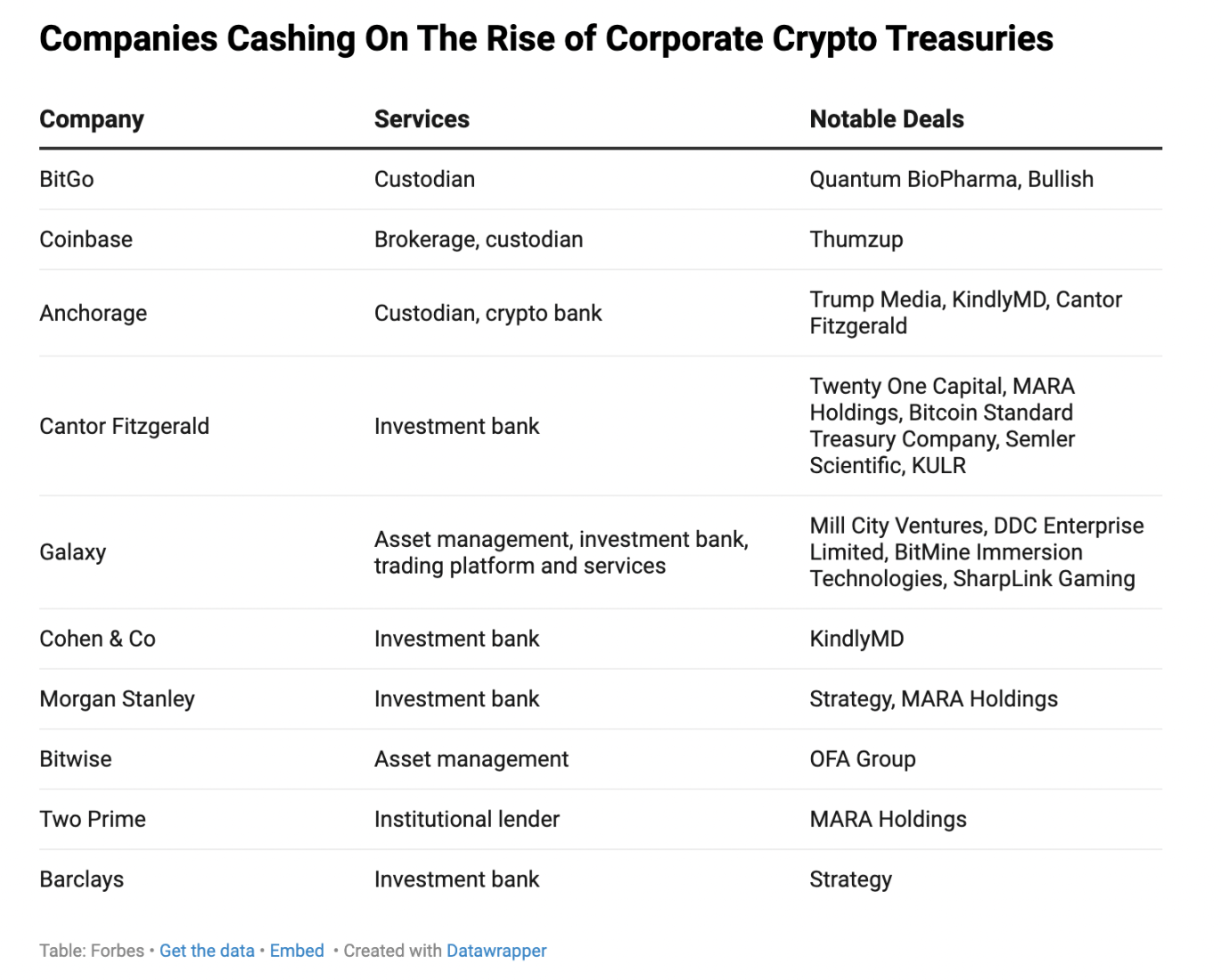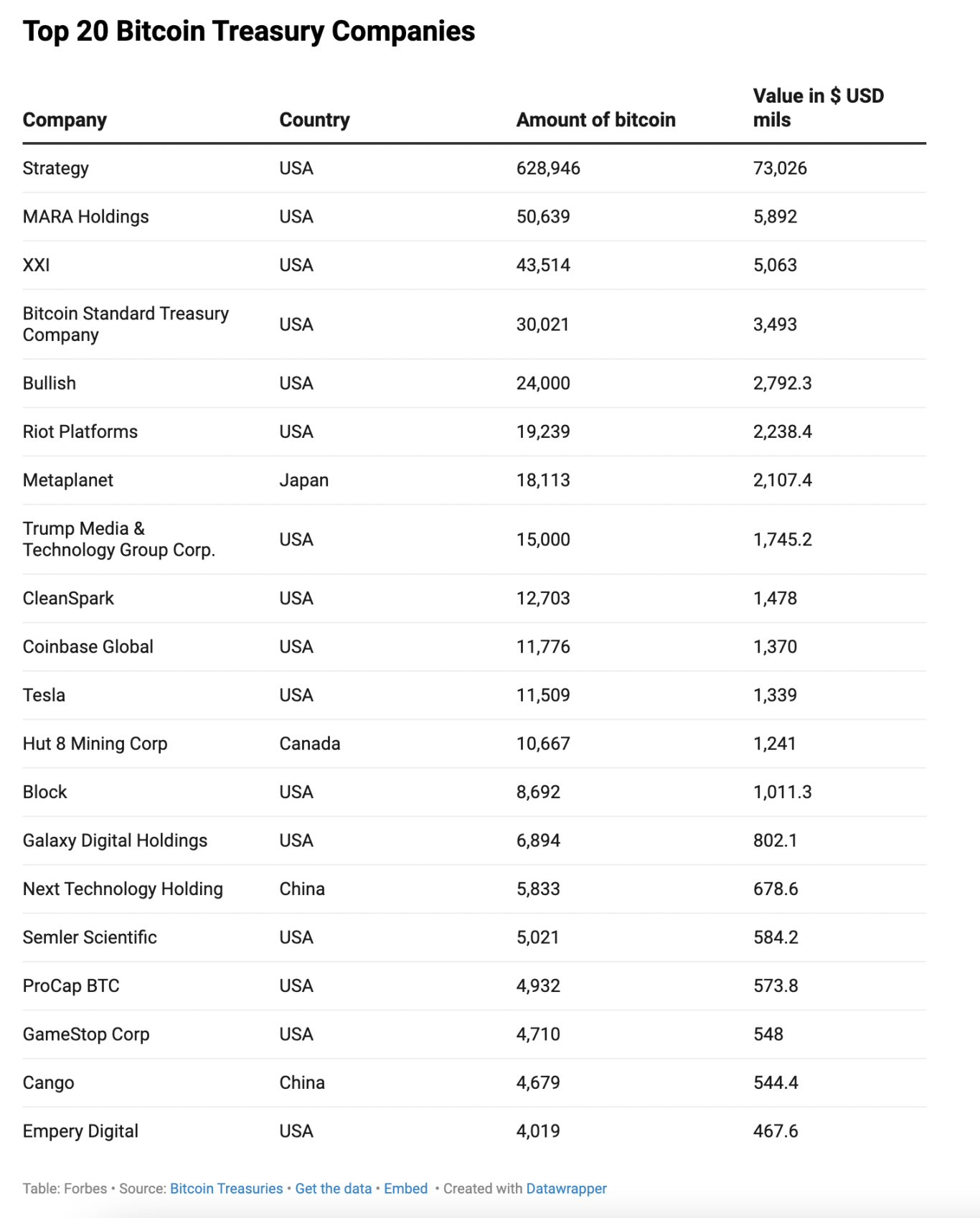The $100 Billion Cryptocurrency Treasury Craze: Who’s Making the Money Behind the Scenes?
- 核心观点:企业加密财库热潮催生服务商巨额收益。
- 关键要素:
- 152家上市公司持超95万枚比特币。
- 托管机构年费率达0.15%-0.30%。
- 企业今年筹资超980亿美元投入。
- 市场影响:推动托管、投行、资管业务增长。
- 时效性标注:中期影响。
By Julie Goldenberg, Forbes
Original translation: Luffy, Foresight News
A record number of publicly traded companies are now adding cryptocurrencies to their balance sheets. Ostensibly, they're doing so to diversify their portfolios, hedge against inflation, and attract new investors; undisclosed reasons, of course, are management's desire to boost stock prices. In recent months, simply announcing a so-called "crypto treasury" strategy has been enough to command a premium for a company's stock price.
However, the real wealth feast is flowing to the "tool vendors" in this latest "gold rush": custodians, brokers, asset managers and investment banks, which charge fees from every trade, transfer and storage business.
Nathan McCauley, co-founder and CEO of San Francisco-based Anchorage Digital, said the trend has “reached fever pitch” and “created a contagious effect” over the past six months. The crypto bank has already secured several deals: custody of Trump Media Group’s $2 billion Bitcoin treasury and $760 million in assets for Nakamoto Holdings, a Bitcoin-focused firm that recently announced a merger with KindlyMD through a special purpose acquisition company (SPAC). KindlyMD, a small, loss-making Salt Lake City healthcare company, had traded below $2 for a long time before the merger announcement in May. Now, Nakamoto Holdings, a tribute to Bitcoin’s anonymous creator, Satoshi Nakamoto, is listed on the Nasdaq (ticker: NAKA) with a share price of $15 and a market capitalization of $114 million.
According to BitcoinTreasuries.net, a year ago, a handful of corporate buyers collectively held just over 416,000 Bitcoins; today, at least 152 publicly traded companies hold over 950,000 Bitcoins, valued at over $110 billion. The undisputed "whale" remains Strategy Inc., owned by billionaire Michael Saylor. The company pioneered the corporate cryptocurrency treasury model, leveraging innovative financing methods such as convertible bonds and floating-rate perpetual preferred stock. Strategy Inc., formerly MicroStrategy, a small software company based in Tysons Corner, Virginia, now holds $73 billion worth of Bitcoin, despite a market capitalization of $95 billion, a 25% premium to its crypto holdings.
Companies following Strategy's lead aren't just targeting Bitcoin; they're also investing in a wide range of crypto assets, including Ethereum and Solana. According to data from Palo Alto-based crypto consultancy Architect Partners, companies have raised over $98 billion for such investments this year alone; since June, another 139 companies have pledged $59 billion. The latest example: World Liberty Financial, a crypto company controlled by the Trump family, recently announced a $1.5 billion treasury centered around its own WLFI token—not including the $2 billion Bitcoin treasury held by the Trump Media Group.

Companies profiting from the rise of corporate cryptocurrency treasuries
Elliot Chun of Architect Partners said that while the overall impact of the trend was difficult to quantify as it was still in its early stages, the boom had already “generated significant fee income across the board”.
For many traditional investment banks and broker-dealers, including Morgan Stanley, Barclays Capital, Moelis & Company, and TD Securities, underwriting commissions and other fees from preferred stock and convertible bond issuances have become a lucrative business.
Take, for example, Strategy's $722 million issuance of 8.5 million shares of preferred stock in March. Morgan Stanley, along with approximately 12 other institutions, acted as underwriters, earning an estimated $10 million in fees. MARA Holdings, a cryptocurrency mining company based in Fort Lauderdale, Florida, issued $950 million in convertible bonds in July, a transaction that Morgan Stanley and other institutions likely profited $10 million from.
Another group of beneficiaries of the cryptocurrency treasury boom are "qualified custodians" —those who hold digital assets for their clients. For example, BitGo, a long-established Palo Alto-based company, saw its assets under custody surpass $100 billion in the first half of 2025, fueled by the crypto market boom and the expansion of corporate treasuries.
"[Corporate treasury] is a growing portion of our business. Six months ago, it wasn't significant, but now it's a significant portion of our new clients," said Adam Sporn, head of brokerage and US institutional sales at BitGo Prime. He estimates that in the past few months alone, approximately two dozen cryptocurrency treasury-related companies have announced custody partnerships with BitGo. This surge in business paved the way for BitGo's confidential IPO filing in July.

Top 20 Bitcoin Treasury Companies
Major custodians like BitGo and Coinbase charge institutional clients a combination of initial fees, annual fees, and surcharges . These fees are tied to the services provided to custody crypto assets and help clients earn returns. Ravi Doshi, co-head of global markets at FalconX, stated that the most common fee model is an annual fee based on the size of the assets under custody, typically ranging from 0.15% to 0.30%, though large clients can negotiate a reduction to 0.10%.
While these fees represent hundreds of millions of dollars in revenue for custodians managing tens of billions of bitcoins, margins on custodial transactions are typically slim. Dan Dolev, senior fintech analyst at Mizuho Securities, notes that the demand for cryptocurrencies generated by these "agents" also generates additional revenue for exchanges and brokers like Coinbase, FalconX, and Cumberland: Buying drives up prices, attracting new investors, which in turn encourages more token trading, creating a cycle.
In addition to trading and custody, services such as staking, lending, and options overlays are another lucrative area. Staking involves users locking up tokens to help validate blockchain transactions and earn rewards. Options strategies adjust the risk-return structure of a portfolio through financial derivatives without changing the underlying asset allocation.
"Once these companies raise funds and include them on their balance sheets, they will soon face the question of 'what next'," said Chun of Architect Partners. "More than $60 billion in crypto assets need to generate returns, and these listed companies can't do it on their own." Sidney Powell, CEO of Melbourne crypto lending company Maple Finance, pointed out that currently companies still rely on the appreciation of underlying assets for returns, but the rapid spread of the cryptocurrency treasury trend will force companies to differentiate themselves by seeking profit strategies or buying Bitcoin with low-cost funds.
Juan Leon, senior investment strategist at Bitwise, a crypto asset management and advisory firm, said that to build a competitive advantage, these companies may turn more to institutional lenders such as Two Prime and Maple Finance, as well as asset managers such as Wave Digital Assets, Arca, and Galaxy, which typically charge 25 to 50 basis points for treasury management services. Earlier this month, Galaxy reported $175 million in inflows to its treasury asset management business, in part due to providing solutions to approximately 20 clients holding cryptocurrency treasuries.
Meanwhile, Wall Street has been fueling the craze. Encouraged by the Trump administration's friendlier policy environment and clearer regulatory framework, Capital Group, hedge fund D1 Capital Partners, and investment bank Cantor Fitzgerald have all provided funding for companies to accumulate cryptocurrencies.
While cryptocurrencies still have their naysayers, the crypto treasury boom is just beginning. "We believe that ultimately all companies will become cryptocurrency treasury companies in some form ," Leon said, noting that global corporate cash reserves currently stand at approximately $31 trillion. "Whether they allocate 1%, 10%, or 100% of their balance sheet to cryptocurrencies, they'll always have some. So there's a lot of room for growth."



